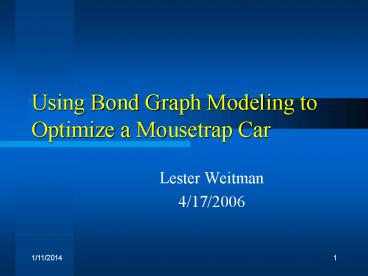Using Bond Graph Modeling to Optimize a Mousetrap Car - PowerPoint PPT Presentation
1 / 30
Title:
Using Bond Graph Modeling to Optimize a Mousetrap Car
Description:
Design car for 9TH grade physics project, within given constraints: Standard VICTOR mousetrap ... HALLELUJAH! WORKING Bond Graph Model: WORKING Bond Graph Model: ... – PowerPoint PPT presentation
Number of Views:243
Avg rating:3.0/5.0
Title: Using Bond Graph Modeling to Optimize a Mousetrap Car
1
Using Bond Graph Modeling to Optimize a Mousetrap
Car
- Lester Weitman
- 4/17/2006
2
Whats a Mousetrap Car?
www.docfizzix.com
3
PROJECT GOALS
- Design car for 9TH grade physics project, within
given constraints - Standard VICTOR mousetrap
- Only spring energy _at_ 1800
- To maximize grade, car must travel
- 5 meters in under 2.75 sec
- gt 20 m total
- Physics dictates key parameters cannot improve
both speed distance.
4
MODELING GOAL
- Create BG of car and simulate speed distance w/
varying - Lever arm length
- Wheel diameter
- Axle diameter
- String HOOP distance to spring axis
- Wheel rotational inertia
- DIRECTIONALLY (not exactly) predictive!
5
PREDICTED ISSUES RESOLVED
- Wheel friction omit (verified no slip)
- Wheel inertial mass (used I1/2M?2 for
measured evenly distributed mass) - Spring energy (measure actual
mousetrap x
.1)
-
6
DETERMINE PARAMETERS
7
CALC Moments of Inertia
Note lumped drive wheel mass ignored smaller
undriven wheels.
Ref http//hyperphysics.phy-astr.gsu.edu/HBAS
E/icyl.htmlicyl
8
CALC Spring Constant (K)
- Used sample data from DocFizzix.com to be very
conservative - PE ½ K Ø2
- DocFizzixs PE .8 J ? K .08 Nm/rad
- Actual Model PE 7.2 J ? K .72 Nm/rad
- DocFizzixs Initial Torque .135 Nm (used)
9
CALC Spring Constant (K)
- Ref http//www.docfizzix.com/shop/tools-
software/t100df.shtml
10
CALC Spring Constant (K)
- K slope of Spring Torque vs. Angle
11
CALC String Velocity
L
u
P
Ø
Law of Cosines u2L2P2-2LPcosØ
u ? x LPsinØ / sqrt(L2 P2 - 2LPcosØ) STRING
VELOCITY u
12
UNANTICIPATED ISSUES
- Could not retrieve actual optimal car.
- Used 3 alternatives.
- MUCH harder to model de-bug in 20-SIM than
anticipated! - Had to verify kinematics were correct.
- Had to experiment to find reasonable value for
axle friction. (Initially ignored, until
simulation car ran forever.)
13
MODELING CHALLENGES
14
MODELING CHALLENGES
- Lever stops when Ø 1800
- Axle should roll freely when lever stops, so car
continues on own momentum. - To simplify analysis, treated car stationary
floor moving w/ mass of car (inversing sign of
TF at wheel).
15
ISSUES RESOLVED
HALLELUJAH!
16
WORKING Bond Graph Model
17
WORKING Bond Graph Model
Modeled spring as MSe, setting it to ZERO when
lever stopped.
18
WORKING Bond Graph Model
Modeled axle as being connected to half of axle
driven by string with a MR (rotational damper),
setting it to ZERO when lever stopped.
19
CONSTANTS USED
20
SAMPLE RUN Parameters
21
SAMPLE RUN
22
PRE-SCREENING EXPERIMENT
23
SIMULATION vs. REALITY
- Directionally matched performance of actual cars.
- Matched intuition
- Longer LEVER ? string pulls longer
- Shorter P (hoop) ? string starts moving
faster, then slows up
24
Placeholder for Final
25
OPTIMIZING DOE
2IV4-1 FRACTIONAL FACTORIAL DESIGN
26
MiniTab Resuts Velocity
27
MiniTab Resuts Distance
28
NEXT STEPS
- Verify MiniTab analysis for optimized values.
29
CONCLUSIONS
- 20-SIM difficult to de-bug for novice
- Need to recall tricks to simulate real world
- Attach MR
- ZERO to connect
- 999999 to disconnect
- Model only needed to be DIRECTIONALLY accurate!
- Model worked adequately in region of interest
for optimization.
30
THE END































